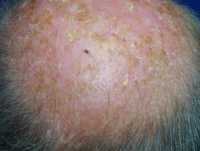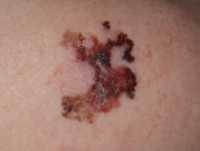Dermatology / 05.08.2024
Basal Cell Skin Cancer: Algorithm May Help Identify More Aggressive Types Before Surgery
MedicalResearch.com Interview with:
 Hannah Ceder
Department of Dermatology and Venereology
Institute of Clinical Sciences, Sahlgrenska Academy
University of Gothenburg
Gothenburg, Sweden
MedicalResearch.com: What is the background for this study?
Response: Many facial basal cell carcinomas (BCCs) are currently excised without prior biopsy, often resulting in incomplete surgical excisions. This practice is concerning because histopathologically high-risk BCCs have an increased risk of postoperative recurrence, necessitating a more meticulous surgical approach.
For facial high-risk BCCs, Mohs micrographic surgery is the recommended treatment method. Given these challenges, there is a clear need for simple, preoperative methods to help physicians identify high-risk tumors. By improving preoperative assessment, these methods could enhance treatment planning, reduce incomplete excisions, and optimize the use of Mohs micrographic surgery for high-risk cases.
(more…)
Hannah Ceder
Department of Dermatology and Venereology
Institute of Clinical Sciences, Sahlgrenska Academy
University of Gothenburg
Gothenburg, Sweden
MedicalResearch.com: What is the background for this study?
Response: Many facial basal cell carcinomas (BCCs) are currently excised without prior biopsy, often resulting in incomplete surgical excisions. This practice is concerning because histopathologically high-risk BCCs have an increased risk of postoperative recurrence, necessitating a more meticulous surgical approach.
For facial high-risk BCCs, Mohs micrographic surgery is the recommended treatment method. Given these challenges, there is a clear need for simple, preoperative methods to help physicians identify high-risk tumors. By improving preoperative assessment, these methods could enhance treatment planning, reduce incomplete excisions, and optimize the use of Mohs micrographic surgery for high-risk cases.
(more…)
 Hannah Ceder
Department of Dermatology and Venereology
Institute of Clinical Sciences, Sahlgrenska Academy
University of Gothenburg
Gothenburg, Sweden
MedicalResearch.com: What is the background for this study?
Response: Many facial basal cell carcinomas (BCCs) are currently excised without prior biopsy, often resulting in incomplete surgical excisions. This practice is concerning because histopathologically high-risk BCCs have an increased risk of postoperative recurrence, necessitating a more meticulous surgical approach.
For facial high-risk BCCs, Mohs micrographic surgery is the recommended treatment method. Given these challenges, there is a clear need for simple, preoperative methods to help physicians identify high-risk tumors. By improving preoperative assessment, these methods could enhance treatment planning, reduce incomplete excisions, and optimize the use of Mohs micrographic surgery for high-risk cases.
(more…)
Hannah Ceder
Department of Dermatology and Venereology
Institute of Clinical Sciences, Sahlgrenska Academy
University of Gothenburg
Gothenburg, Sweden
MedicalResearch.com: What is the background for this study?
Response: Many facial basal cell carcinomas (BCCs) are currently excised without prior biopsy, often resulting in incomplete surgical excisions. This practice is concerning because histopathologically high-risk BCCs have an increased risk of postoperative recurrence, necessitating a more meticulous surgical approach.
For facial high-risk BCCs, Mohs micrographic surgery is the recommended treatment method. Given these challenges, there is a clear need for simple, preoperative methods to help physicians identify high-risk tumors. By improving preoperative assessment, these methods could enhance treatment planning, reduce incomplete excisions, and optimize the use of Mohs micrographic surgery for high-risk cases.
(more…)







 Professor Marie-Aleth Richard
EADV Communications Committee Chair
Professor, University Hospital of La Timone
Marseille, France
MedicalResearch.com: What is the background for this Roundtable event? Would you describe the mission of the European Commission’s Beating Cancer Plan?
Response: Europe’s Beating Cancer Plan is the first, comprehensive EU strategy on cancer, aimed at tackling the disease through all key stages: prevention; early detection; diagnosis and treatment; and quality of life of cancer patients and survivors. The Plan also aims to create opportunities to improve cancer care through research and innovative projects, such as artificial intelligence, and to promote equal access to knowledge and treatments in cancer care across Europe.
The EADV seeks to create a bridge between the EU health policy agenda and scientific research, by engaging with policymakers, patient organisations and other stakeholders to support a patient centric-approach; tackling melanoma and non-melanoma skin cancers (NMSC) at all stages of the pathway, from prevention to follow-up care.
Through our Roundtable event, the EADV brought together these key stakeholders to evaluate the effectiveness of the EBCP on preventing both melanoma and NMSC, as well as identify joint recommendations that step-up measures towards this goal.
Professor Marie-Aleth Richard
EADV Communications Committee Chair
Professor, University Hospital of La Timone
Marseille, France
MedicalResearch.com: What is the background for this Roundtable event? Would you describe the mission of the European Commission’s Beating Cancer Plan?
Response: Europe’s Beating Cancer Plan is the first, comprehensive EU strategy on cancer, aimed at tackling the disease through all key stages: prevention; early detection; diagnosis and treatment; and quality of life of cancer patients and survivors. The Plan also aims to create opportunities to improve cancer care through research and innovative projects, such as artificial intelligence, and to promote equal access to knowledge and treatments in cancer care across Europe.
The EADV seeks to create a bridge between the EU health policy agenda and scientific research, by engaging with policymakers, patient organisations and other stakeholders to support a patient centric-approach; tackling melanoma and non-melanoma skin cancers (NMSC) at all stages of the pathway, from prevention to follow-up care.
Through our Roundtable event, the EADV brought together these key stakeholders to evaluate the effectiveness of the EBCP on preventing both melanoma and NMSC, as well as identify joint recommendations that step-up measures towards this goal.